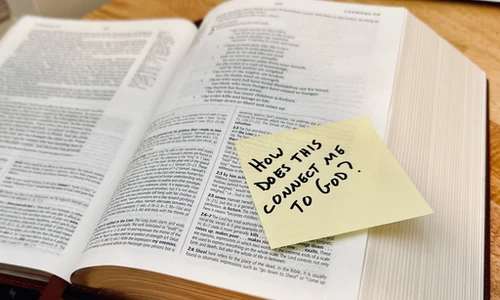Every creditor shall release what he has lent to his neighbor. He shall not exact it of his neighbor, his brother, because the LORD’s release has been proclaimed.
This release—this Jubilee—sounds like an economic fairy tale—every seven years, debts are erased, slaves are freed, and land is restored. But when you read the fine print, it gets even stranger: the mercy doesn’t extend to everyone. Israelite debts are canceled, but foreign ones aren’t.
What’s going on?
At first glance, Jubilee seems unfair in two ways. First, if we both agreed to a loan, I have a right to expect to be paid back. Second, if God values mercy, why draw a national boundary around it? Why forgive your brother but not your neighbor? This tension in Deuteronomy 15 invites us to inquire more deeply. When we do, we discover not favoritism but formation: God teaching His people how to embody His mercy in real-world economics.
God’s Economics: Mercy by DesignPermalink
The Jubilee system was a foundational feature of Israel’s covenant life, a rhythm designed to keep wealth from ossifying and hearts from hardening. Every seventh year, creditors released what they had lent to fellow Israelites. The poor, or those who had become poor, found breathing room again.
If you read Leviticus 25, you’ll notice the same pattern: every seventh year is a sabbath for the land, and after seven of those—forty-nine years—comes the grand Jubilee, when even ancestral land reverts to its original family. Debt forgiveness, sabbath rest, and gleaning laws in Leviticus 19 all hum to the same tune: mercy is not optional in God’s kingdom.
That tune keeps playing in the story of Ruth, where gleaning laws turn a destitute foreign widow’s labor into providence and ultimately lineage for David and Jesus.
It plays again in Amos and Isaiah 58, where the prophets rail against those who keep sabbaths but crush the poor.
And it crescendos in Jesus, who announces in Luke 4 that the Spirit has anointed Him to proclaim “the year of the Lord’s favor.” The ultimate Jubilee.
Deuteronomy’s release year is an early verse in that one long song.
The Limits of ForgivenessPermalink
Still, that demarcation line remains: “Of a foreigner you may exact it [the debt].” God draws a boundary around the mercy. At first, it feels bureaucratic, like divine fine print. But exceptions like this can help us understand the deeper purpose of the rule.
The simple fact is that foreigners, even those living on the same land, weren’t part of Israel’s covenant community. Jubilee wasn’t a global monetary policy; it was family business. God was training His people to practice mercy within His household, so that their common life would display His character to the nations.
That’s also why foreign debt collection wasn’t a moral failure. The world would see what divine compassion looked like when a nation ordered itself around mercy rather than profit. Israel’s debt laws were theology in motion: they declared, “Yahweh rules here, and under His rule, nobody stays crushed forever.”
When you peel back the policy, two truths shine through: mercy and sovereignty.
Mercy is obvious. God refuses to let His people perpetuate cycles of poverty. The poor, the widow, the orphan—the people most likely to owe money—get a restart every seven years. Jubilee is mercy and compassion built into the calendar.
Sovereignty is subtler but just as central. The land, the wealth, and the time itself all belong to God. Cancelling debts inside Israel doesn’t deplete the nation’s wealth because it wasn’t theirs to begin with. It simply reorders what was already God’s. But foreign loans cross covenant lines—those involve Israel’s integrity before other nations. God maintains Israel’s credibility without compromising His mercy.
So the boundary teaches both dependence and discipline: be generous where God rules directly; be wise where you represent Him to the world.
If you’d like to explore this theme more deeply, the Deuteronomy Chapter-by-Chapter guide walks through these laws verse by verse, tracing how covenant identity shapes daily economics.
Theology with a CalendarPermalink
Jubilee didn’t exist to optimize GDP. It existed to form a people who trusted God enough to release what they had. Every seven years, they rehearsed a truth modern life forgets: mercy and ownership can’t coexist unexamined. When God orders your economy, open hands replace closed fists, and we are reminded that everything we have comes from God.
Imagine trying to run a business under those rules. You’d have to lend generously depite knowing the seventh year might erase the ledger. God even anticipated the temptation to hedge your mercy as the Jubilee drew near:
Take care lest there be an unworthy thought in your heart and you say, ‘The seventh year, the year of release is near,’ and your eye look grudgingly on your poor brother, and you give him nothing, and he cry to the LORD against you, and you be guilty of sin.
That sin isn’t lending unwisely. It’s withholding mercy because you’re afraid to lose. In God’s math, generosity is always solvent.
That’s a theology worth practicing even without a theocratic economy. As the Incomplete List of Things Over Which God Has Sovereignty reminds us, He owns everything—land, breath, time, and mercy itself.
Modern Echoes: Practicing Release TodayPermalink
We don’t live under Jubilee law. But we do live under the same God. The rhythm of release can still shape us—spiritually, relationally, even economically.
Mercy begins where control ends. Sometimes that means forgiving an actual debt; maybe a forgotten $40 loan to a friend or a book you’ll never get back1. Sometimes it’s emotional debt, the resentment you’ve been collecting interest on for years. Sometimes it’s spiritual, laying down guilt you were never meant to keep.
Communities can practice the same rhythm. Imagine churches or clubs structuring sabbath-shaped generosity: forgiving small debts, canceling late fees in community programs, or simply pausing to remind one another that everything we hold is on loan from God. These gestures proclaim God’s mercy and sovereignty in miniature.
When Israel ignored the rhythm, prophets like Amos thundered: “They sell the righteous for silver and the needy for a pair of sandals” (Amos 2:6). Economic injustice went beyond policy failure to idolatry against the Most High God. They had stopped trusting the God who provides through mercy.
Jesus picks up the same melody in the Parable of the Unmerciful Servant (Matthew 18)—a man forgiven an impossible sum refuses to forgive a smaller one. He has gravely misunderstood the lesson: those who have received divine mercy must become conduits of it. The cross is the final fulfillment of Jubilee. The release year has become permanent.
And the practice remains instructive. Every time we forgive, every time we open our hands, we join that same Jubilee song. We proclaim again that God owns the land, the wealth, the future, and the grace.
Living in God’s EconomyPermalink
God’s system still works.
Canceling debts inside Israel preserved community trust, prevented generational poverty, and kept the poor from permanent exile. Collecting debts from foreigners preserved the nation’s stability and witness. It’s an economy calibrated for holiness and compassion, not efficiency.
What might that look like now? Maybe we build cultures of release rather than resentment. Maybe we remind each other that no one gets out of this world solvent. Mercy is our only currency that lasts.
Pick Up the ThreadPermalink
→ What could mercy look like in your community if you scheduled it—built it right into your rhythms of life?
→ Explore Nothing Left Over, another reflection on God’s abundance and the art of open-handed living.
-
Captain Adama was right: never lend books, just give them. ↩



